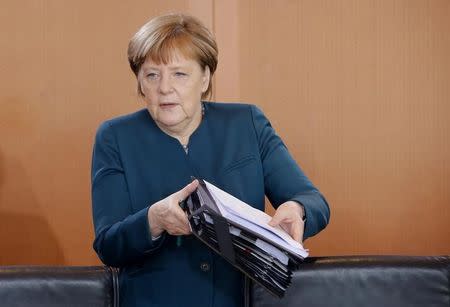Support for Merkel's conservatives edges up in benchmark survey

BERLIN (Reuters) - Voter support rose for German Chancellor Angela Merkel and her conservative bloc and fell for the anti-immigrant far-right AfD party, a poll conducted amid a fraught national debate over migration showed on Friday. The "Deutschlandtrend" survey for national broadcaster ARD, widely regarded as Germany's most authoritative poll and conducted as three of the country's larger regions prepare for elections, showed Merkel's CDU/CSU bloc gained two percentage points to 37 percent. The party has been losing ground in recent months as many voters have turned against the Chancellor's open-door refugee policy, which she has been forced to backtrack on as migrants fleeing war and extreme poverty in the Middle East and beyond have continued to reach Europe in record numbers. Germany took in 1.1 million last year and, in an effort to reduce the flow, federal lawmakers on Thursday agreed tougher rules for asylum seekers, including making it easier to deport foreign nationals who commit crimes. Migrant arrivals into German have also fallen sharply in recent days, due mainly to bad weather and a bottleneck as border restrictions by countries further south along the migrant route kick in, German federal police said. On Wednesday, just 140 migrants reached Germany, compared with daily peaks of up to 10,000 last year. The compilers of Friday's survey made no direct link between refugee numbers and the level of support for Merkel, but previous polls showing the one rising while the other falls suggest a correlation. Deutschlandtrend, which questioned 1,028 voters on Tuesday and Wednesday, also showed support falling for the far-right Alternative for Germany, a relatively new party pushing an anti-immigrant agenda and which dropped by two points to 10 percent, making it the fourth strongest nationwide. The first big litmus test of the German public's stance on the migrant crisis takes place on March 13, when voters in wealthy south-western Baden-Wuerttemberg, neighbouring Rhineland-Palatinate and eastern Saxony-Anhalt will cast state-level ballots. They will be Germany's first regional elections since last autumn. (Reporting by Tina Bellon; Editing by Michael Nienaber and John Stonestreet)

